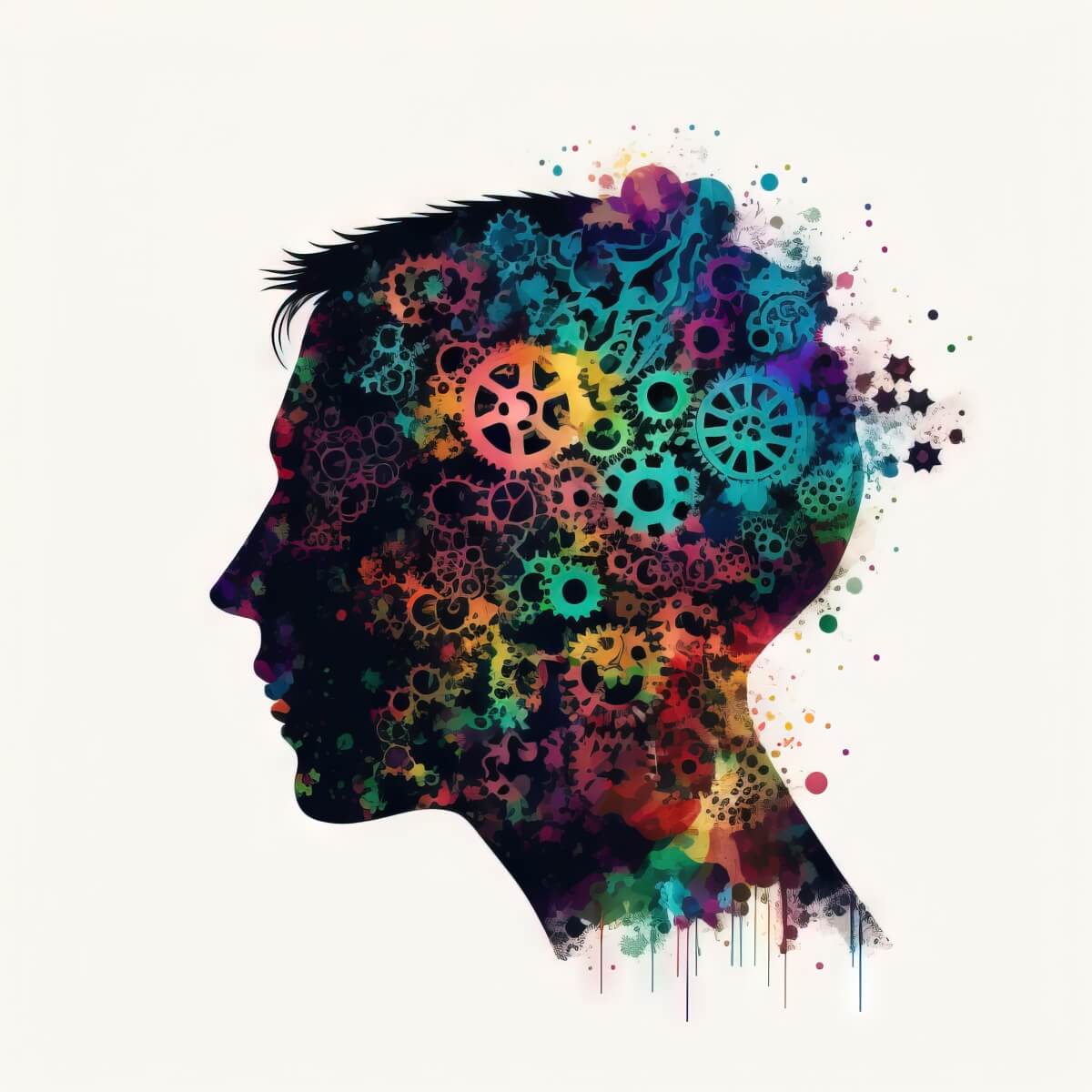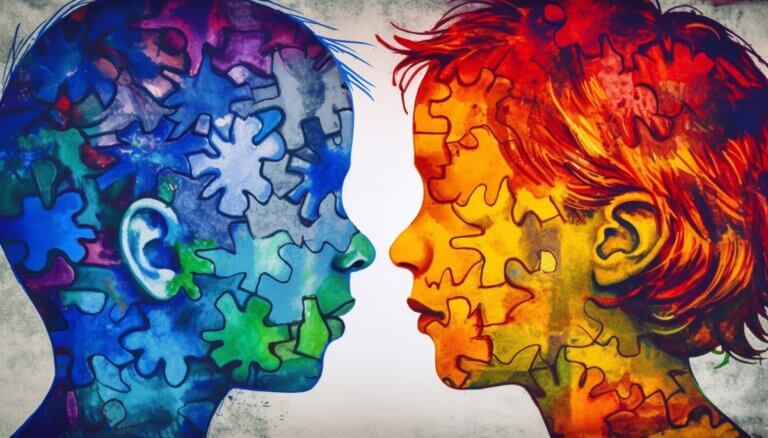Table of Contents
Self-perception and Self-regulation

Recognizing One’s Own Emotions
Empathetic understanding and the well-considered navigation through one’s emotional labyrinth are central core competencies of Emotional Intelligence. The ability to precisely identify one’s feelings is the foundation for a rich inner life and successful external interactions. The Emotional Intelligence skills that come into play here enable improved self-reflection and decision-making.
The Art of Emotion Perception
Imagine you are in a heated discussion. Your cheeks are flushed, your voice raises, your pulse races. These are clear signals from the body indicating strong emotions. Successful individuals can capture and interpret these signs of Emotional Intelligence traits. A study by the American Psychologist found that individuals who can accurately recognize their feelings lead better interpersonal relationships and handle conflicts more constructively.
- Neurological studies show how mindfulness training strengthens the neural basis of self-awareness and promotes the connection between the prefrontal cortex and the emotion-processing areas of the brain.
- In the work context, recognizing one’s own emotions helps to respond confidently to criticism or regulate one’s own stress levels.
- In private life, people with high Emotional Skills gain quality of life, as they better understand and express their own emotional needs.
Tools for Emotion Identification
Mindfulness exercises such as meditation or guided reflections are field-tested methods that contribute to the development of Emotional Intelligence competencies. The technique of contemplative observation aids in consciously perceiving feelings without judging them. A participant in a study on mindfulness meditation showed how, after an eight-week training, his ability to recognize and regulate emotions significantly improved.
It isn’t just research that underscores the importance of emotional self-awareness; it is also the everyday experiences that teach us how crucial a deep emotional understanding is for our well-being and relationships. The constant practice and the endeavor to explore the intimate layers of one’s emotional world represents a rewarding path that leads to personal growth and professional success.
Controlling One’s Own Emotions
Emotions influence our decisions, relationships, and performance in both private and professional settings. One of the core competencies of Emotional Intelligence is the ability to recognize and manage one’s own feelings. This is a fundamental prerequisite for dealing with emotional challenges and ultimately being successful and satisfied.
Finding Yourself
Self-awareness is the first step towards controlling one’s own emotions. Reflecting on what triggers certain emotions and how they affect behavior lays the foundation for developing Emotional Intelligence skills. It is important to observe one’s own feelings without judgment and to accept that emotions are a natural response of our body.
Emotion Regulation in the Workplace
In a professional context, uncontrolled emotions can lead to conflicts and decrease productivity. Appropriate Emotional Self-regulation, on the other hand, can promote collaboration and contribute to a healthy work atmosphere. It is necessary not to give in to emotional reactions impulsively, but to pause for a moment and consciously decide how to act.
- Breathing exercises can help maintain a cool head and reduce stress.
- Cognitive restructuring is a technique where negative thought patterns are identified and replaced with more constructive ones.
- Problem-solving strategies require understanding the underlying emotions to respond appropriately.
Developing these Emotional Intelligence competencies is a process that requires time and practice. However, being aware of one’s own emotions and their effects can be a positive step towards being more successful in both professional and private life. Learning and using emotions purposefully as a resource enables constructive engagement with challenges and promotes personal growth. Take the time to explore the nuances of your emotional world and master the piano playing of Emotional Skills – it will be rewarding.
Social Competence and Relationship Management

Empathy and Social Awareness
Emotional intelligence consists of various core competencies, which include empathy and social awareness. These two elements are indispensable when it comes to building and maintaining sustainable interpersonal relationships. A pronounced social awareness enables us to correctly interpret social signals and to act with situational sensitivity.
The Power of Empathy
Empathy is the ability to intuitively understand and share the emotions of others. Imagine an employee who notices that his colleague is stressed and offers to take on part of the workload. This simple example shows how empathy can lead to concrete support and an improved work environment. In leadership positions, empathy is equally central. A leader who is empathetic is often perceived by employees as more accessible and understanding, which in turn strengthens trust in management and increases employee motivation.
Emotional Intelligence Characteristics such as empathetic behavior are valued not only in professional life but also in private life. In partnerships, for example, empathy helps to recognize and respond to the needs and desires of the other person. This promotes a deeper emotional connection.
Social Awareness and Collaboration
Social awareness refers to the understanding of social dynamics and the ability to move adequately in social contexts. In teams, a high level of social awareness helps to strengthen collaboration. When team members recognize and respect social cues, it leads to better communication and more effective work processes.
- Emotional intelligence skills like active listening play a major role here – they allow not only perceiving the words but also the meanings behind the words.
- Conflicts can be recognized earlier and resolved constructively thanks to social sensitivity.
- Emotional skills such as expressing one’s own feelings in an understandable and non-confrontational way strengthen togetherness.
The integration of empathy and social awareness constitutes the Emotional Intelligence Competencies that are crucial not only for individual satisfaction but also for success in professional and private relationships. Research in organizational psychology shows that teams with emotionally intelligent members often perform better and exhibit a higher level of engagement.
In conclusion, it is important to understand that empathy and social awareness are trainable and that their development is an essential part of personal and professional development. By cultivating these aspects of emotional intelligence, we open doors to deeper human connections and a more fulfilled life.
Effective Communication and Conflict Resolution
Effective communication and the ability to resolve conflicts are core competencies of emotional intelligence, which are essential in both private and professional relationships. Individuals with strong emotional intelligence skills know how to recognize their own emotions and those of their conversation partners, respond appropriately, and thus lay the foundation for constructive interaction.
The Role of Self-Awareness
A critical aspect of emotional intelligence is self-awareness. For instance, a team leader might notice that their frustration over unexpected project delays is affecting their communication. By recognizing and regulating their own emotions, they can remain objective and constructive, even when it becomes challenging.
- Show empathy: Placing oneself in the other’s position can lead to a better understanding of their feelings and perspectives and provide an appropriate response.
- Use language consciously: It’s not just about what we say, but how we say it. Nonverbal signals, tone of voice, and choice of words are crucial.
- Active listening: Genuine attention and the effort to understand the other person are essential features of emotional intelligence and reduce misunderstandings.
Emotion Management in Practice
Especially in conflict situations, the importance of emotional intelligence competencies becomes evident. For example, when two colleagues have opposing views, the competency of emotion regulation helps to not take the discussion personally and to channel emotions like anger or disappointment constructively.
- Impulse control: Not immediately reacting to negative emotions but taking a moment can defuse the situation.
- Stay solution-focused: Instead of focusing on blame, emotionally intelligent individuals concentrate on common goals and solutions.
- Constructively use feedback: Criticism is not seen as an attack but as an opportunity for improvement and is communicated respectfully.
Building Positive Relationships
Emotional intelligence significantly contributes to forming long-term and positive relationships. Through empathetic behavior and the competency to regulate both one’s own and others’ emotions, an atmosphere of trust and mutual respect is created.
- Relationship perception: The ability to read emotions in relationships and respond to them fosters a trusting coexistence.
- Positive feedback: Emotionally intelligent individuals understand the power of recognition and positive reinforcement.
- Authenticity: Sincerity and transparency in communication strengthen credibility and foster good relationships.
By cultivating the skills of emotional intelligence, effective communication and constructive conflict resolution become achievable goals in the pursuit of successful and harmonious interpersonal relationships.
Summary
Emotional Intelligence (EI) encompasses key competencies such as self-awareness, self-regulation, motivation, empathy, and social skills. These abilities are crucial for success in personal and professional relationships. Academic research supports that a high level of Emotional Intelligence correlates with better mental health, outstanding leadership, and more effective communication skills.
Self-Awareness and Self-Regulation
Self-awareness is one of the core competencies of Emotional Intelligence. It allows us to recognize and understand our own emotions. This forms the foundation for how we think and act. Self-regulation, another important aspect of EI, empowers us to control impulses and express emotions appropriately. Individuals with high emotional self-regulation can manage stress more effectively and remain calm in challenging situations.
- Techniques such as mindfulness and meditation can help strengthen self-awareness and improve self-regulation.
- Neurological studies suggest that regular mindfulness training can change the brain and lead to better regulation of emotions.
- In the workplace, Emotional Intelligence skills such as the ability to give and receive constructive feedback contribute to better team dynamics.
Empathy and social awareness, further Emotional skills, enable us to recognize others’ feelings and respond appropriately. Empathetic behavior can lead to deeper and enhanced interpersonal relationships. Social awareness, on the other hand, helps us understand and navigate group dynamics. Research findings suggest that teams whose members possess pronounced emotional intelligence competencies are more cohesive and productive.
Communication and Conflict Resolution
Communication ability is closely linked to Emotional Intelligence, especially in conflict situations. Well-developed emotion management is essential for constructive conflict resolution.
- Impulse control and solution-oriented communication help effectively resolve conflicts in the workplace.
- The ability to actively listen and show empathy can significantly improve communication quality and avoid misunderstandings.
- Constructively using feedback allows for learning from challenges and advancing both personally and professionally.
Overall, developing the key competencies of Emotional Intelligence not only fosters successful interactions in all areas of life but also contributes to improved quality of life and health. These abilities are essential for effective interpersonal relationships and personal satisfaction. By investing in them, we can lay the foundation for a fulfilled life, both professionally and privately.
FAQ – Key Competencies of Emotional Intelligence
How can self-regulation and empathy, as components of emotional intelligence, be applied and promoted in a professional context?
Self-regulation in professional life enables the mastery of stressful moments and challenges through targeted self-control and emotional balance, which is seen in more effective time management and constructive responses to criticism. Empathy, on the other hand, is the bridge to improved interpersonal relationships, as it allows for a deeper understanding of colleagues and customers, leading to enhanced communication skills and increased teamwork. Both skills can be promoted through training, conscious reflection of one’s own behavior, and feedback cultures that support both self-awareness and mutual understanding.
What specific skills are part of the core competencies of emotional intelligence, and how are they applied in everyday life?
Emotional intelligence includes recognizing and understanding one’s own emotions as well as empathy for the emotions of others, which leads to better interpersonal relationships. Another core competence is the ability to deliberately control and regulate emotions, which is particularly advantageous in stressful situations or during conflicts, as it allows one to remain calm and find effective solutions. In everyday life, emotional intelligence is demonstrated by constructively addressing conflicts, showing understanding and support in interpersonal relationships, and using one’s own emotions as a guide for decision-making.
Which specific skills constitute the core competencies of emotional intelligence in the professional work environment?
Emotional intelligence in a professional work environment is based on the ability to recognize and understand one’s own emotions and those of others, and to use this information for thoughtful action and effective communication. This includes the ability to regulate emotions to reduce stress, resolve conflicts, and demonstrate empathy, which in turn leads to better interpersonal relationships. A synergistic interaction of these skills allows one to master challenging situations in the workplace with composure and create an inspiring work climate.




